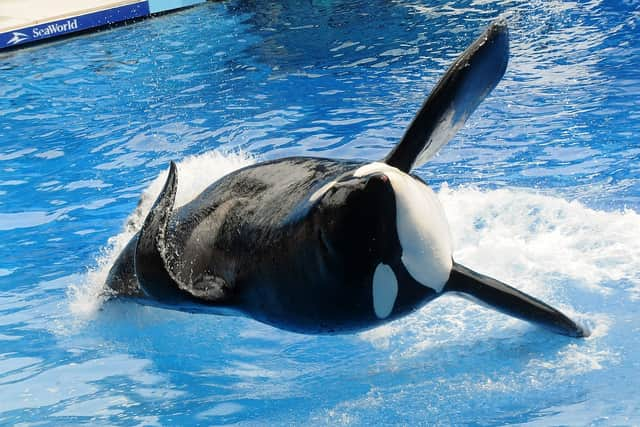Why was Lolita the orca controversial? Grief as beloved 'Toki' dies before getting a chance at a better life
This article contains affiliate links. We may earn a small commission on items purchased through this article, but that does not affect our editorial judgement.
and live on Freeview channel 276
An orca held captive for more than half a century has died, on the brink of plans that would have allowed her to finally see her ocean home again.
On Friday, Miami Seaquarium posted a statement from the non-profit group Friends of Toki on social media that Lolita – formerly known as Tokitae, or Toki – had started exhibiting "serious signs of discomfort" over the past two days.
Advertisement
Hide AdAdvertisement
Hide AdSeaquarium and Friends of Toki medical team members began treating her immediately, but the 57-year-old orca died from an apparent renal condition, the statement said.
“Toki was an inspiration to all who had the fortune to hear her story and especially to the Lummi nation that considered her family," it said. “Those who have had the privilege to spend time with her will forever remember her beautiful spirit.”
Animal rights activists had long been fighting to have Lolita freed from the Miami Seaquarium. She had been living for years in a 24-by-11-metre tank, which was about six metres deep, PA reports.
The park's new owner - The Dolphin Company - and the Friends of Toki non-profit announced a plan in March to possibly move her to a natural sea pen in the Pacific Northwest, with the financial backing of Indianapolis Colts owner Jim Irsay.


Advertisement
Hide AdAdvertisement
Hide AdThe US$20 million plan involved using a cargo plane to fly the 3,600kg marine mammal to a 15-acre netted area in the sea, which would protect her as she was considered too weak to protect herself or hunt on her own, Yahoo news reports.
Mr Irsay said he was "heartbroken" over her death, and that she would not be able to return to the sea.
“Her story captured my heart, just as it did millions of others. I was honoured to be part of the team working to return her to her indigenous home, and I take solace in knowing that we significantly improved her living conditions this past year," he said. “Her spirit and grace have touched so many. Rest in peace, dear Toki.”
Why was Lolita's captivity and care controversial?
Lolita was caught in the wild as a young orca - just four years old - from the Pacific Ocean near Seattle in August 1970. She has been in captivity at Miami Seaquarium since September 1970, more than 50 years.
Advertisement
Hide AdAdvertisement
Hide AdThe orca had performed in live shows until 2022, Euronews reports. Marine mammal entertainment shows are controversial, particularly those involving orcas, with animal welfare activists concerned about the long-lived, highly intelligent mammals spending decades confined to small enclosures - in defiance of their natural tendency to swim great distances.


On occasion the frustrated animals would lash out at their human trainers, with deadly results. Tilikum, a male orca who spent much of his life performing at SeaWorld, was famously linked to the deaths of two whale trainers, as well as a trespasser whose body was found in his tank. His story was a large part of the documentary Blackfish.
While Lolita's performances ended last year, her living conditions attracted fresh controversy in February. Footage taken by an activist revealed the orca - as well as manatees and white-sided dolphins - floating alone in a tank with green, dirty-looking water. The activist said it was far too small and "unsustainable for life", and was hidden away from the general public.
What have activists said about Lolita's death?
The Lummi Nation, a Native American tribe based in Washington state, refers to orcas as “qwe ‘lhol mechen”, which means “our relations below the waves”.
Advertisement
Hide AdAdvertisement
Hide AdThe tribe had spent years working to secure Lolita’s release and her return to her home waters. On hearing news of her death, chairman Tony Hillaire said: “The Lummi Nation is saddened by the news that our beloved Orca relative has passed away at the estimated age of 57 years old.
“Our hearts are with all those impacted by this news; our hearts are with her family. We stand in solidarity with our Lummi members whom poured their hearts and souls into bringing Sk’aliCh’elh-tenaut home.”
US-based animal activists PETA said in a statement: "Kind people begged the Miami Seaquarium to end Lolita’s hellish life in a concrete cell and release her to a seaside sanctuary, where she could dive deep, feel the ocean’s currents, and even be reunited with the orca believed to be her mother."
But plans to make this move came too late, they said, "and Lolita was denied even a minute of freedom from her grinding 53 years in captivity".
Advertisement
Hide AdAdvertisement
Hide AdPETA urged families to honour her memory by not visiting parks with marine mammal performances, and called on the Seaquarium to continue with plans to send the dolphin who was Lolita’s tankmate to a seaside sanctuary.
They also hoped SeaWorld would "learn from this tragedy" and consider a similar plan for their orca Corky, who has also been in captivity for nearly 54 years.
Comment Guidelines
National World encourages reader discussion on our stories. User feedback, insights and back-and-forth exchanges add a rich layer of context to reporting. Please review our Community Guidelines before commenting.
